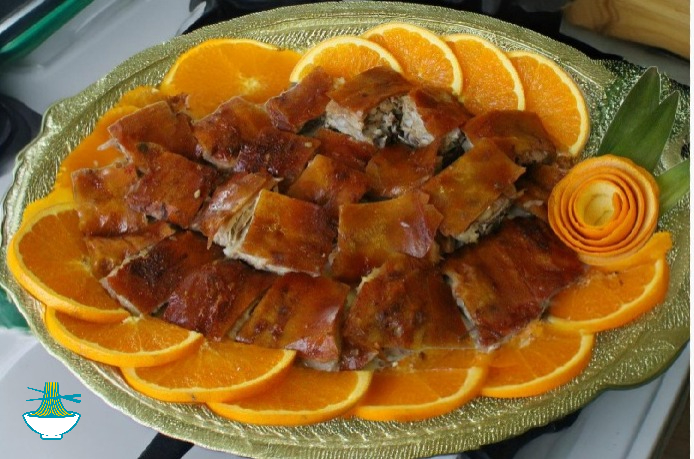Experience the exquisite flavors of Leitão à Bairrada,a beloved dish from Portugal's.Savor the tender,slow-roasted known for its crispy skin and flavorful meat.
Immerse yourself in Portugal's culinary legacy with this iconic dish, cherished for its authentic preparation and unforgettable taste.
Ingredients:
- 1 whole suckling pig (around 8-10 kg), cleaned and prepared
- Coarse salt, to taste
- 6-8 cloves of garlic, minced
- 4-6 bay leaves
- 1 tablespoon paprika
- 1 tablespoon white wine vinegar
- 1/4 cup olive oil
- Freshly ground black pepper, to taste
- Water, as needed
Instructions:
1-Preheat your oven to 180°C (350°F).
2-Score the skin of the suckling pig with a sharp knife in a crisscross pattern. This helps the skin to become crispy during roasting.
3-Rub the pig inside and out with coarse salt, ensuring it's evenly distributed. Let it sit for about 30 minutes to allow the salt to penetrate the meat.
4-In a small bowl, mix together the minced garlic, paprika, white wine vinegar, olive oil, and black pepper to form a paste.
5-Rub the paste all over the pig, making sure to massage it into the scored skin and inside the cavities.
6-Place the bay leaves inside the pig's cavities for added flavor.
7-Transfer the pig to a large roasting pan or tray, preferably with a rack to elevate it slightly.
8-Pour a little water into the bottom of the roasting pan to prevent the juices from burning during cooking.
9-Roast the pig in the preheated oven for about 3 to 4 hours, or until the skin is crispy and golden brown, and the meat is tender and cooked through. Baste the pig with its own juices occasionally throughout the cooking process.
10-Once cooked, remove the pig from the oven and let it rest for about 15-20 minutes before carving.
11-Serve the Leitão à Bairrada hot, accompanied by traditional sides such as crispy potatoes, orange slices, and a simple salad.
Enjoy the authentic flavors of Portugal with this classic Leitão à Bairrada recipe!
Nutritional Values :
Suckling Pig:
As a whole suckling pig varies greatly in size, it's challenging to provide precise nutritional values. However, it's generally high in protein and fat, with varying amounts of vitamins and minerals. Per 100g of roasted suckling pig, you might find:
- Calories: Approximately 400-500 kcal
- Protein: Around 20-25g
- Fat: Approximately 30-40g
- Carbohydrates: Negligible
benefits : Suckling pig is a good source of high-quality protein. Protein is essential for building and repairing tissues, including muscles, skin, and organs. It also plays a crucial role in immune function, hormone production, and enzyme synthesis.
Olive Oil (1/4 cup):
- Calories: Approximately 480 kcal
- Fat: Approximately 54g
- Carbohydrates: 0g
- Protein: 0g
benefits :
- Rich in monounsaturated fats, which are associated with heart health and may help lower LDL (bad) cholesterol levels.
- Contains antioxidants that combat inflammation and oxidative stress in the body.
- Supports the absorption of fat-soluble vitamins like A, D, E, and K.
Garlic (6-8 cloves):
- Calories: Approximately 15-20 kcal
- Carbohydrates: Around 3-4g
- Protein: Around 1g
- Fat: Negligible
benefits :
- Possesses antimicrobial properties that may help fight off infections and promote a healthy immune system.
- Contains sulfur compounds with potential cardiovascular benefits, such as reducing blood pressure and improving cholesterol levels.
- Acts as a prebiotic, nourishing beneficial gut bacteria and promoting digestive health.
Paprika (1 tablespoon):
- Calories: Approximately 20 kcal
- Carbohydrates: Around 4g
- Protein: Around 1g
- Fat: Around 1g
benefits :
- Rich in antioxidants like carotenoids and capsaicin, which have anti-inflammatory and immune-boosting properties.
- May aid digestion by stimulating gastric secretions and promoting healthy gut function.
- Contains vitamins and minerals such as vitamin A, vitamin E, and iron.
White Wine Vinegar (1 tablespoon):
- Calories: Approximately 3 kcal
- Carbohydrates: Around 0.1g
- Protein: Negligible
- Fat: Negligible
benefits :
- Provides acetic acid, which may help control blood sugar levels and improve insulin sensitivity.
- Contains polyphenols, which have antioxidant properties and may protect against oxidative damage.
- Can contribute to a healthy gut microbiome by supporting the growth of beneficial bacteria.
Bay Leaves (4-6 leaves):
- Calories: Negligible
- Carbohydrates: Negligible
- Protein: Negligible
- Fat: Negligible
benefits :
- Contains essential oils like eugenol and cineole, which have anti-inflammatory and antimicrobial properties.
- May help regulate blood sugar levels and improve insulin sensitivity.
- Provides vitamins and minerals such as vitamin A, vitamin C, calcium, and magnesium.
Salt and Pepper:
- Calories: Negligible
- Carbohydrates: Negligible
- Protein: Negligible
- Fat: Negligible
benefits :
- Provides essential minerals like sodium and potassium, which are crucial for maintaining fluid balance, nerve function, and muscle contraction.
- Adds flavor to dishes, making them more enjoyable and satisfying.
- Can stimulate saliva production, aiding in the digestion process.
Please note that these values are approximate and can vary based on factors such as portion size, specific ingredients used, and cooking methods. Additionally, the nutritional content of the dish can be influenced by factors like the amount of fat rendered during cooking and whether the skin is consumed.


Comments